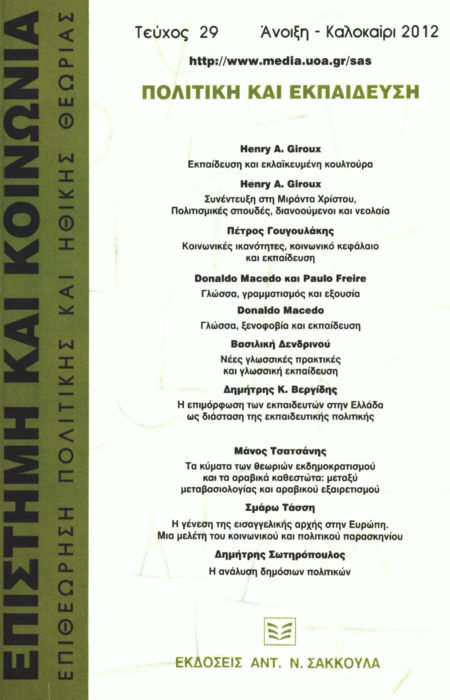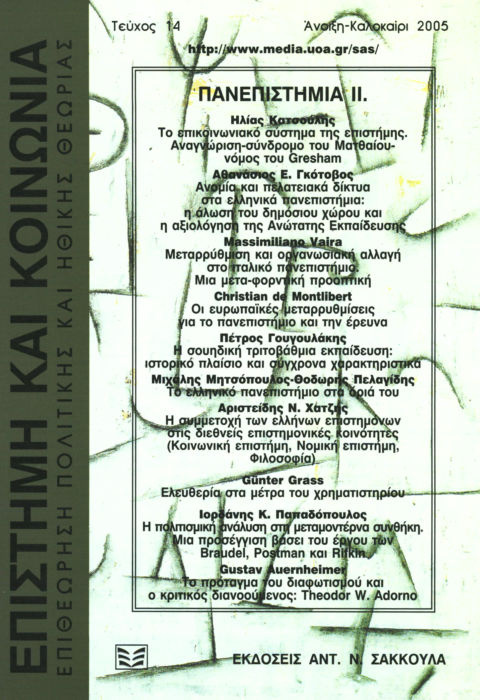Κοινωνικές ικανότητες, κοινωνικό κεφάλαιο και εκπαίδευση
Περίληψη
Πλαίσιο αναφοράς του λόγου του παρόντος κειμένου αποτελεί η επίκαιρη θεωρητική και πολιτική συζήτηση περί ικανοτήτων τις οποίες θα πρέπει να καλλιεργήσουν, μέσα από διαδικασίες δια βίου μάθησης, τα μέλη μιας σύγχρονης κοινωνίας ώστε να μπορέσουν να αντεπεξέλθουν στις προκλήσεις και απαιτήσεις πραγματικοτήτων όπως η (οικονομική) παγκοσμιοποίηση, η πληροφορική επανάσταση και η πολυπολιτισμικότητα ως απόρροια του νέου χαρακτήρα των μεταναστευτικών ρευμάτων. Ενδεικτική είναι και η σύσταση του Συμβουλίου της Ευρωπαϊκής Ένωσης και του Ευρωπαϊκού Κοινοβουλίου σχετικά με την καλλιέργεια βασικών ικανοτήτων για τη δια βίου μάθηση, ανάμεσα στις οποίες συμπεριλαμβά- νονται ‘οι κοινωνικές ικανότητες και οι ικανότητες που σχετίζονται με την ιδιότητα του πολίτη’. Στο πρώτο μέρος του κειμένου εισάγονται οι έννοιες ικανότητα-ικανότητες και κοινωνικό κεφάλαιο. Η πρώτη εξετάζεται κριτικά μέσα από το πρίσμα της συλλογικής μάθησης και η δεύτερη μέσω των δεικτών της, δηλαδή της εμπιστοσύνης, της συνεργασίας και της επικοινωνίας. Στο δεύτερο μέρος παρουσιάζεται ένας πρώτος προβληματισμός σχετικά με τον ρόλο και τη συμβολή της (εκ)παίδευσης στη δημιουργία κοινωνικού κεφαλαίου. Το ευρύτερο ερώτημα στο οποίο εστιάζει η διερεύνηση διατυπώνεται ως εξής: για ποιον λόγο προβάλλεται επιτακτικά η ανάπτυξη των κοινωνικών ικανοτήτων στις μέρες μας και ποιος ο ρόλος της εκπαίδευσης στη δημιουργία κοινωνικού κεφαλαίου;
Λεπτομέρειες άρθρου
- Πώς να δημιουργήσετε Αναφορές
-
Γουγουλάκης Π. (2015). Κοινωνικές ικανότητες, κοινωνικό κεφάλαιο και εκπαίδευση. Επιστήμη και Κοινωνία: Επιθεώρηση Πολιτικής και Ηθικής Θεωρίας, 29, 37–53. https://doi.org/10.12681/sas.864
- Ενότητα
- Άρθρα
Οι Συγγραφείς που δημοσιεύουν εργασίες τους σε αυτό το περιοδικό συμφωνούν στους παρακάτω όρους:
- Οι Συγγραφείς διατηρούν τα Πνευματικά Δικαιώματα και χορηγούν στο περιοδικό το δικαίωμα της πρώτης δημοσίευσης ενώ ταυτόχρονα τα πνευματικά δικαιώματα της εργασίας προστατεύονται σύμφωνα με την άδεια Creative Commons Αναφορά Δημιουργού - Μη Εμπορική Χρήση - Παρόμοια Διανομή 4.0 Διεθνές , που επιτρέπει σε τρίτους - αποδέκτες της άδειας να χρησιμοποιούν την εργασία όχι για εμπορικούς σκοπούς, με την προϋπόθεση της διατήρησης των διατυπώσεων που προβλέπονται στην άδεια σχετικά με την αναφορά στον αρχικό δημιουργό και την αρχική δημοσίευση σε αυτό το περιοδικό και με διανομή τυχόν τροποποιήσεων υπό την ίδια άδεια όπως και το πρωτότυπο.
- Οι Συγγραφείς μπορούν να συνάπτουν ξεχωριστές, και πρόσθετες συμβάσεις και συμφωνίες για την μη αποκλειστική διανομή της εργασίας όπως δημοσιεύτηκε στο περιοδικό αυτό (π.χ. κατάθεση σε ένα ακαδημαϊκό καταθετήριο ή δημοσίευση σε ένα βιβλίο), με την προϋπόθεση της αναγνώρισης και την αναφοράς της πρώτης δημοσίευσης σε αυτό το περιοδικό.
- Το περιοδικό επιτρέπει και ενθαρρύνει τους Συγγραφείς να καταθέτουν τις εργασίες τους μέσω διαδικτύου (π.χ. σε ένα ακαδημαϊκό καταθετήριο ή στους προσωπικές τους ιστοσελίδες) πριν και μετά από τις διαδικασίες της δημοσίευσης, καθώς αυτό μπορεί να οδηγήσει σε παραγωγική ανταλλαγή ιδεών και σκέψεων καθώς επίσης και σε γρηγορότερη και μεγαλύτερη χρήση και ευρετηρίαση της δημοσιευμένης εργασίας (See The Effect of Open Access).
Λήψεις
Τα δεδομένα λήψης δεν είναι ακόμη διαθέσιμα.
Αναφορές
Andershed, Η., Μ. Ljungzell, Κ. Sjöberg & L. Svensson (2007). Vnd kan man lära av arbetsplatslärande? Utveckling av yrkesutbildningar inom industri, aldreomsorg och kri- minalvärd. Lindesberg: APeLAB/ÄFFLAEqual.
Bourdieu, P. (1997). Kultur och kritik Anföranden. Göteborg; Daidalos.
Broady, D. (1998). ‘Kapitalbegreppet som utbildningssociologiskt verktyg’ Uppsala: Uppsala universitet, Skeptronhäften/Skeptron Occasional Papers nr 1.
Coleman, J. (1990). The Foundations of Social Theory. Cambridge: Harvard University Press.
Δεμερτζής, N. (2006). Ή εμπιστοσύνη ως κοινωνικό συναίσθημα’. Επιστήμη και Κοινωνία, 16:39-67.
Dewey, J. (1966). Democracy and Education: An Introduction to the Philosophy of Education. New York: The Free Press.
Επιτροπή ίων Ευρωπαϊκών Κοινοτήτων (2000). Υπόμνημα οχετικά με την εκπαίδευση καθ' όλη τη διάρκεια της ζωής. Βρυξέλλες: Επιτροπή των Ευρωπαϊκών Κοινοτήτων, http:// ec.europa.eu/education/lifelong-learning-policy/doc/policy/memo_el.pdf
European Commission. The Lifelong Learning Programme: education and training opportunities for all, http://ec.europa.eu/education/lifelong-learning-programme/index_en.htm
Ευρωπαϊκό Κοινοβούλιο και Συμβούλιο (2006). ‘Βασικές ικανότητες για τη Δια Βίου Μάθηση - ένα Ευρωπαϊκό Πλαίσιο Αναφοράς’, Επίσημη Εφημερίδα της Ευρωπαϊκής Ένωσης, 30 Δεκεμβρίου /L394 http://www.europarl.europa.eu/sides/getDoc.do?pubRef=-// EP//TEXT+TA+P6-TA-2006-0365+0+DOC+XML+V0//EL
Frane, A. (επψ.). (2007). Social Capital and Governance. Old and Neio Members of the Ell in Comparison. Berlin: Lit Verlag.
Gougoulakis, P. (2006). Bildning och lärande-om folkbildningens pedagogik. [Μόρφωση και μά- Θηση-Η παιδαγωγική της Λαϊκής Επιμόρφωσης], Stockholm: ABF.
Gültekin, S. (2011). “New public management: Is it really new?’, International journal of Human Sciences, 8:2. http://www.insanbilimleri.com/en
Hagström, T. & Hansson, M. (2003). “Flexible work contexts and human competence. An action-interaction frame of reference and empirical illustrations’, στο: A. Bron & M. Schemmann, (επιμ.) Knowledge society, information society and adult education. Trends, issues and challenges. Hamburg: Lit Verlag.
Κονιόρδος, Σ. Μ. (2006). “Κοινωνικό Κεφάλαιο: Μεταξύ θεωρητικής σαφήνειας και σύγχυσης’, Επιστήμη και Κοινωνία, 16: 1-38, http://www2.media.uoa.gr/sas/issues/16_ issue/koniordos.html
Le nouveau petit Robert (2003). Dictionnaire alphabétique et analogique de la langue française. Paris: Dictionnaires le Robert.
Liedman, S-E. (2008). Nycklar till ettframgàngsrikt liv?-Om EU: s nyckelkompetenser. Stockholm: Skolverket.
Liedman, S-E. (2006). Stemma i själen. Form och materia frân antiken till idag. Stockholm: Bonniers.
Mertens, D. (1974). Schlüssel qualifikationen. Thesen zur Schulung für eine modern Gesellschaft’ http://panorama.ch/files/2745.pdf
Νικολούδης, Δ. (2010). ‘Κριτική παιδαγωγική και γραμματισμός’, διδακτορική διατριβή Θεσσαλονίκη: Αριστοτέλειο Πανεπιστήμιο/Παιδαγωγικό Τμήμα Δημοτικής Εκπαίδευσης.
OECD (2005). The Definition and Selection of Competencies (DeSeCo). Executive Summary’, http://www.pisa.oecd.org/dataoecd/47/61/35070367.pdf
Πασιάς, Γ. & I. Ρουσσάκης (χ.χ.). Όι σχηματισμοί λόγου της Ευρωπαϊκής Κοινότητας και οι επιδράσεις τους στη διαμόρφωση της ελληνικής εκπαιδευτικής πολιτικής. Μελέτη περίπτωσης: Τα ΕΠΕΑΕΚ 1 και 2 και η εκπαιδευτική μεταρρύθμιση 1997-2001’, http:// www.alfavita.gr/artra/art24_7_9_0803.php
Περπερίδης, Π. (2008). Το επικοινωνιακό μοντέλο του J. Habermas και η συμβολή του στην κριτική παιδαγωγική θεωρία’, διδακτορική διατριβή. Θεσσαλονίκη: Αριστοτέλειο Πανεπιστήμιο, Τμήμα Φιλοσοφίας και Παιδαγωγικής, Τομέας Φιλοσοφίας.
Persson, A. (2003). Social kompetens. När individen, de andra och samhället mots. Lund: Studentlitteratur.
Πλειός, Γ. (2005). Πολιτισμός της εικόνας και εκπαίδευση. Ο ρόλος της εικονικής ιδεολογίας. Αθήνα: Εκδόσεις Πολύτροπον
Prokou, Ε. (2008). ‘A comparative Approach to lifelong Learning Policies in Europe: the cases of the UK, Sweden and Greece’, European journal of Education, 43:123-140.
Putnam, R. (1995). “Bowling Alone: America's Declining Social Capital’, journal of Democracy, 65-78, http://xroads.virginia.edu/~HYPER/DETOC/assoc/bowling.html
Putnam, R. (2000). Bowling Alone. Die Collapse and Revival of American Community. New York: Simon & Schuster.
Rose-Krasnor, L. (1997). The nature of social competence: A theoretical review’, Social Development 6,1:111-135.
Rothstein, B. (1998). ‘Varifrân kommer det sociala kapitalet?’ SOCIALVETENSKAPLIG TIDSSKRIFT, Àrgâng 5,2-3:164-171.
Rothstein, B. & S. Kumlin (2001). “Demokrati, socialt kapital och förtroende’, στο S.Holmberg & L. Weibull (επιμ.), Land du välsignade: SOM-rapport 2001. Göteborg: SOM-institutet, Göteborgs universitet.
Rychen, D.S. & L.H. Salganik (επιμ.) (2001). Defining and selecting key competencies. Seattle, WA: Hogrefe & Huber.
Rychen, D.S. & L.H. Salganik (επιμ.) (2003). Key competencies for a successful life and a wellfunctioning society. Cambridge, Mass. :Hogrefe and Huber.
Rychen, D.S. & A. Tiana, (επιμ.) (2004). Developing key competencies: Some lessons from international and national experience. Paris: UNESCO, International Bureau of Education.
Shor, I. (1992). Empowering Education. Critical Teaching for Social Change. Chicago & London: The University of Chicago Press.




